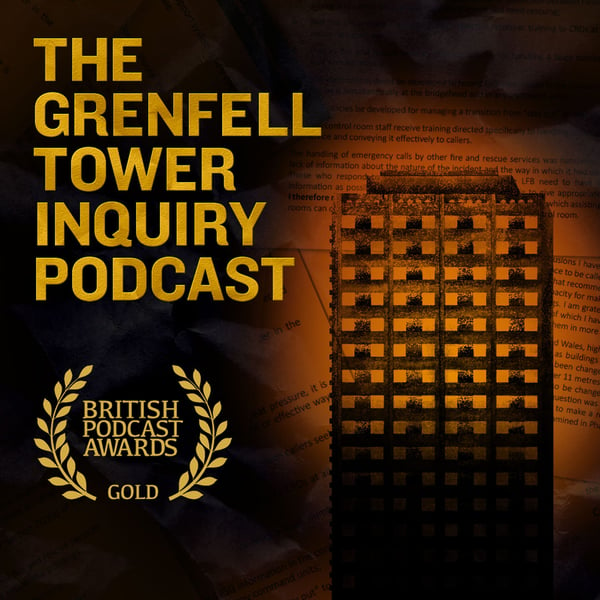203 The End of the Hearings
The Grenfell Tower Inquiry Podcast
BBC
4.8 • 627 Ratings
🗓️ 11 November 2022
⏱️ 49 minutes
🧾️ Download transcript
Summary
After more than four years, more than three hundred thousand documents, four hundred days of testimony and around £150 million, the Inquiry heard its final evidence.
Lawyers for the core participants put forward the arguments they think the chair of the Inquiry, Sir Martin Moore-Bick, should consider as he produces his final report.
Lead Counsel Richard Millett said all the deaths at Grenfell Tower were avoidable and strongly criticised companies and organisations involved in the refurbishment for failing to take responsibility.
And Paulos Tekle, a Tower resident, whose five-year-old son lost his life on the night of the fire, tells us what he expects from the final report.
Presenter: Kate Lamble
Producers: Sharon Hemans and Luke Radcliff
Researcher: Marcia Veiga
Sound Engineer: Gareth Jones
Editor: Hugh Levinson
Transcript
Click on a timestamp to play from that location
| 0:00.0 | BBC Sounds, Music, Radio, podcasts. |
| 0:05.1 | Hello and welcome to the Grenfell Tower Inquiry podcast with me, Kate Lamble. |
| 0:10.5 | The inquiry started back in May 2018, and this week, more than four years on, after more than 300,000 documents, 400 days of testimony and around around £150 million, it heard the final closing statements. |
| 0:25.8 | Lawyers for all the core participants were invited to put forward the arguments they think the chair of the inquiry, Sir Martin Mourbic, should consider as he produces the final report, |
| 0:36.5 | examining how such combustible materials were placed on the outside of the 24-storey tower. |
| 0:42.9 | We'll start with lead counsel to the inquiry Richard Millett, |
| 0:46.1 | whose closing statement was particularly forthright. |
| 0:49.3 | From all of the evidence that you have heard at Phase 2, |
| 0:52.5 | you are able to distill a single overall conclusion |
| 0:56.2 | that there was nothing unknown or not reasonably knowable which caused or contributed to the fire |
| 1:03.5 | and its consequences. On the contrary, each and every one of the risks which eventuated at Grenfell |
| 1:10.4 | Tower on that night were well known by many and ought to have been known by all who had any part to play. |
| 1:17.7 | As a result, you will be able to conclude with confidence that each and every one of the deaths that occurred in Grenfell Tower on the 14th of June 2017 was avoidable. |
| 1:30.4 | It would be impossible, Richard Millett said, for Sir Martin Morbick to find any single |
| 1:35.1 | originating cause for the disaster. Instead, the reasons were many, complex and in many cases |
| 1:41.4 | inextricably interlinked. |
| 1:43.1 | It is open to you on the evidence to conclude that there was a long run-up of incompetence |
| 1:50.7 | and poor practices in the construction industry and the fire engineering and architects' profession, |
| 1:57.4 | weak and incompetent building control, cynical and possibly even dishonest practices in the cladding and insulation materials manufacturing sector, |
| 2:06.6 | incompetence, weakness and malpractice by those responsible for testing and certifying those materials, |
| 2:13.6 | the failure of central government to act despite known risks, failures of competence, training and oversight |
| 2:21.0 | within the TMO and over it by RBCC, a failure by the LFB to learn the lessons of Lacknell and other fires |
... |
Please login to see the full transcript.
Disclaimer: The podcast and artwork embedded on this page are from BBC, and are the property of its owner and not affiliated with or endorsed by Tapesearch.
Generated transcripts are the property of BBC and are distributed freely under the Fair Use doctrine. Transcripts generated by Tapesearch are not guaranteed to be accurate.
Copyright © Tapesearch 2025.

